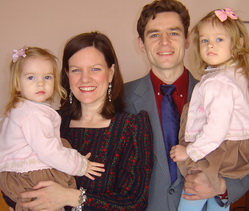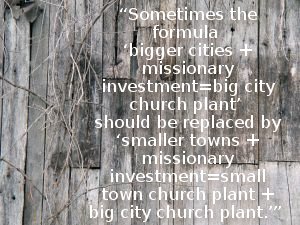An Interview with Anne Sokol, Part 2
 Read Part 1.
Read Part 1.
Keri: I know that you and Vitaliy both have a lot of ministries going on and you had talked earlier on about your nurse midwife dream and I’d like you to tell the listeners about how the Lord is bringing some of that to fruition in your life now.
Anne: That desire to be a midwife has never really left me. You know it goes under the water for a while but it always resurfaces. It’s like it follows me. About two years ago I started studying to be a doula and childbirth educator. I started studying with a Christian organization called Charis Childbirth. I never really saw how I could do it here because birth here is kind of a mystery for me. I knew women usually have horrible experiences, but it was hard to get any real details and to really know what it looked like. But I started studying this class and through women in my church, I started teaching them childbirth preparation classes. Then I was able to accompany them at their births.
That has been a major eye opener—seeing an actual birth in a birth house. Other women choose to have home births and I have watched how those things happen. The women in my church, and the husbands too, have been so thankful for this ministry that is unique and something that not very many people do. They are so happy to be having happy birth experiences.
Now I’m starting to get clients who are not Christians, and it has been wonderful to have chances to witness to them. Lately, I’ve been working with a couple from Belgium. They are English speakers. Vitaliy and I went out to dinner with them and he presented the gospel to them. It’s neat how childbirth is such an open time in people’s lives. Being educated about it and serving people makes them so open to listen to you about any area of life. It has made people really open to the Lord. I’m really thankful for that.
 Keri: So, Anne, I’m excited to talk to you. This is the first time we’ve ever spoken.
Keri: So, Anne, I’m excited to talk to you. This is the first time we’ve ever spoken. I’m originally from Philadelphia and spent my earliest years in a Philadelphia housing project. My dad was a prison guard for the city prison system and I was usually on the wrong side of the law. My brother John became a Christian in 1970 and for three years hounded me about “getting saved.”
I’m originally from Philadelphia and spent my earliest years in a Philadelphia housing project. My dad was a prison guard for the city prison system and I was usually on the wrong side of the law. My brother John became a Christian in 1970 and for three years hounded me about “getting saved.” Few people have ever captured and caricatured all levels of American society more successfully than did cartoonist Al Capp in his classic comic strip “Li’l Abner.” Arguably, the funniest sequences in the series are those where Abner, Mammy, or other members of the Yokum clan venture from their home in Dogpatch into the big city. There they interact with the urbanites, and hilarity ensues. For all of their sophistication and culture, the socialites can never seem to get the best of the hillbillies from the Ozarks.
Few people have ever captured and caricatured all levels of American society more successfully than did cartoonist Al Capp in his classic comic strip “Li’l Abner.” Arguably, the funniest sequences in the series are those where Abner, Mammy, or other members of the Yokum clan venture from their home in Dogpatch into the big city. There they interact with the urbanites, and hilarity ensues. For all of their sophistication and culture, the socialites can never seem to get the best of the hillbillies from the Ozarks. In a previous article I highlighted some of the reasons why many missionaries do not plant churches once they are on the field.
In a previous article I highlighted some of the reasons why many missionaries do not plant churches once they are on the field. At the beginning of January, I packed my bags and flew to Fortaleza, Brazil, to attend the five-day
At the beginning of January, I packed my bags and flew to Fortaleza, Brazil, to attend the five-day  Recently, I had a conversation with a Muslim-background Christian. He shared the story of his childhood in a Muslim village in a North African country. There were no Christians, there were no Bibles, there was no testimony to the gospel, and there had been no missionaries. He had a dream in which Jesus spoke to him and told him that He was the Way, the Truth, and the Life.
Recently, I had a conversation with a Muslim-background Christian. He shared the story of his childhood in a Muslim village in a North African country. There were no Christians, there were no Bibles, there was no testimony to the gospel, and there had been no missionaries. He had a dream in which Jesus spoke to him and told him that He was the Way, the Truth, and the Life. In a couple of days I’ll board a plane and fly to Fortaleza, Brazil. The trip is not about SharperIron, but it is about iron sharpening iron. Some months ago, a missionary our church supports financially contacted me and asked if I’d be willing to preach at the regional conference for Baptist Mid-Missions (BMM) in northeast Brazil. I felt honored by the invitation and was eager to go if the Lord provided the funding.
In a couple of days I’ll board a plane and fly to Fortaleza, Brazil. The trip is not about SharperIron, but it is about iron sharpening iron. Some months ago, a missionary our church supports financially contacted me and asked if I’d be willing to preach at the regional conference for Baptist Mid-Missions (BMM) in northeast Brazil. I felt honored by the invitation and was eager to go if the Lord provided the funding. Dissatisfaction with current missionary training has led to radical proposals. Ferris, following Frame, proposes that “we dump the academic model once and for all—degrees, accreditation, tenure, the works” (Ferris 1990, 16).
Dissatisfaction with current missionary training has led to radical proposals. Ferris, following Frame, proposes that “we dump the academic model once and for all—degrees, accreditation, tenure, the works” (Ferris 1990, 16).
Discussion